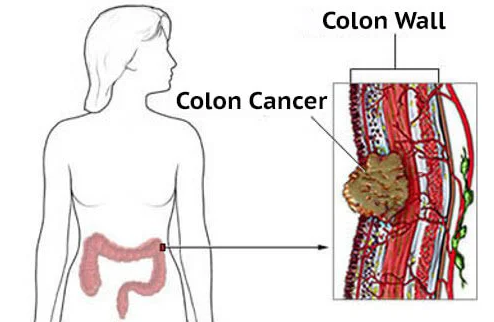Colorectal Cancer
Overview
What is Colorectal cancer?
Risk Factors
Your risk of getting colorectal cancer increases as you get older. Other risk factors include having—
- Inflammatory bowel disease such as Crohn’s disease or ulcerative colitis.
- A personal or family history of colorectal cancer or colorectal polyps.
- A genetic syndrome such as familial adenomatous polyposis (FAP)external icon or hereditary non-polyposis colorectal cancer (Lynch syndrome).
Lifestyle factors that may contribute to an increased risk of colorectal cancer include—
- Lack of regular physical activity.
- A diet low in fruit and vegetables.
- A low-fiber and high-fat diet, or a diet high in processed meats.
- Overweight and obesity.
- Alcohol consumption.
- Tobacco use.
Diagnosis
In most cases, colon cancers will not have any symptoms in the early stages; they become more apparent when the disease reaches the advanced stages. Therefore, high-risk individuals should consider regular screening, which helps in early detection and on-time treatment.
a. Physical Exam and Medical History Assessment
b. CEA Blood Test
c. Faecal Occult Blood Test
d. Colonoscopy
e. Biopsy
f. Imaging Tests


Treatment
The treatment planning for colon cancer cases is made based on various factors, which include the stage of the disease, the tumour grade, the patient’s age and his/her overall condition.
Early-stage colon cancers are usually treated with surgery; however, as the disease progresses, more comprehensive treatment plans are required which may include chemotherapy, radiation therapy, immunotherapy and targeted therapy.
Surgery is the main line of treatment for colon cancers. The treatment plan for both early-stage and advanced-stage cancers include surgery in most cases. Depending on the disease stage, one of the following surgical procedures may be recommended by the doctor:
- Polypectomy
- Endoscopic Mucosal Resection
- Laparoscopic Surgery
- Partial Colectomy
- Surgery to Expel Faecal Matter
n order to get rid of residual cancer cells, radiation therapy is recommended after the surgery. During this procedure, intense radiation beams are used to destroy the cancer cells. Since it is a non-invasive procedure, one can receive radiation therapy as an outpatient. In patients with advanced-stage colon cancers, radiation therapy may be recommended to shrink the tumour and relieve pain and other symptoms caused by cancer..
During chemotherapy, strong anticancer drugs are used to destroy the cancer cells. As a systemic therapy, this treatment approach destroys cancer cells throughout the body. Chemotherapy may be administered before the surgery in order to shrink the tumour or after the surgery to kill the residual cancer cells.
Specific proteins released by the colon cancer cells blind the immune cells, and this stops them from attacking the cancer cells and controlling the cancer growth. Immunotherapy aims at stimulating the body’s immune system to fight against cancer. Immunotherapy is usually recommended for patients with advanced-stage colon cancers.
While administering targeted therapy, specific pathways are used by cancer cells to grow, divide and spread to nearby organs. The targeted therapy drugs block these pathways and cease cancer growth. This is not the main line of treatment for colon cancer, and it is recommended only in the advanced stages when the cancer is not responding to any other treatments.
We Treat Cancer Problems
what can we do for you?




